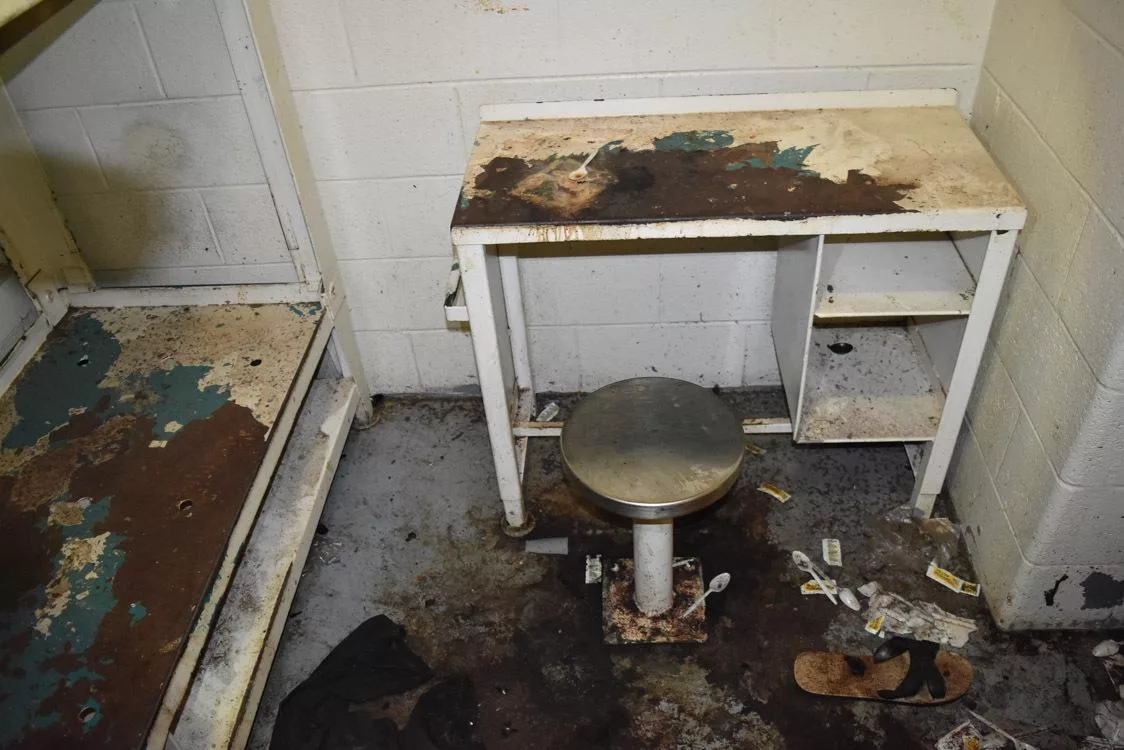DOJ Finds Deplorable Conditions at Atlanta’s Fulton County Jail
The report comes after The Appeal and other news outlets spent years reporting on dangerous conditions inside the facility, leading to attacks on teenagers and LGBTQ+ people, malnutrition, and death.

On Thursday, the U.S. Department of Justice (DOJ) released a damning report on conditions at Atlanta’s Fulton County Jail. Federal investigators say officers and detainees routinely brutalize other imprisoned people, staff often ignore allegations of sexual assault, and people with mental illness, people perceived as gay or transgender, and children are at the greatest risk of violence.
The DOJ began its investigation into the jail in 2023 after international outrage over the death of LaShawn Thompson, a man with mental illness who died inside a filthy cell.
“Today’s Justice Department report confirms that abuse at the Fulton County Jail has been not just horrific, but also unconstitutional,” Georgia Senator Jon Ossoff said in a press release. “Each day these conditions persist is a failure to uphold Georgians’ human and Constitutional rights.”
The investigation comes after The Appeal and other news outlets spent years reporting on horrific conditions inside the Fulton County Jail, as well as a separate DOJ investigation into civil rights abuses across the Georgia prison system. Last year, The Appeal reported on a lawsuit Harold Joseph Kendall filed against the Fulton County Sheriff’s Office and others. Kendall’s 18-year-old autistic son Shane died by apparent suicide in 2021 after reporting malnutrition, bullying, and abuse inside the facility.
At a press conference on Thursday, Fulton County Sheriff Patrick Labat emphasized changes that have occurred since the DOJ began its investigation. He said the jail population has decreased thanks to an inmate advocacy unit that works with prosecutors, public defenders, and the courts. Labat said his office has released nearly 1,400 people who are considered nonviolent.
“It is a point-in-time study,” Labat said of the report.
Labat, who has long raised alarms about the facility’s conditions, has pushed to build a new jail and lease bed space in other facilities. But community members have opposed his proposed solutions. Advocates instead say the county should reduce the jail’s population and divert more people from imprisonment. Tiffany Williams Roberts, public policy director with the Atlanta-based Southern Center for Human Rights (SCHR), told The Appeal in an email that she hopes the DOJ’s report “will signal to governmental actors that they need to focus on reducing the jail population, rooting out abuse a rather than the acquisition of real estate.”
“We are grateful to the Department of Justice Civil Rights Division for responding to calls from SCHR and others regarding the culture of human rights violations in the Fulton County Jail,” she said. “The recommended next steps from the DOJ give the sheriff and county leadership a practical roadmap for how to begin to alleviate the egregious harm that has persisted for decades.”

The DOJ report details violence perpetrated by staff and detainees, rampant extortion schemes, filthy living conditions, vermin infestations, and atrocious healthcare.
“Housing units are full of flooded water from broken toilets and sinks,” the report says. “Cockroaches, rodents, and other pests abound, and the Jail takes insufficient steps to control infestations. Cells and common areas are filthy and unhygienic with dangerous exposed wires.”
The DOJ found that the jail does not provide detainees with enough food, which has led to malnutrition and widespread hunger. The famine has also put detainees at risk of violence. A man with diabetes said guards tased him for taking an extra lunch sack. Investigators say that officers often tase detainees for “violating rules even where they pose no threat to the safety or security of anyone.” In one instance, an officer asked a detainee to pick up a basketball—when the detainee did not, the officer tased him.
“Excessive force is so commonplace in the Jail that officers have a cavalier attitude when it occurs,” DOJ says.
In another incident detailed in the report, a sergeant pepper sprayed two incarcerated people in two separate incidents within ten minutes, then called them both “idiot[s].” Body-worn camera footage shows that the victims did not physically or verbally threaten anyone.
An officer told the sergeant, “Man, Sarge, you’re on fire today.’”
Detainees also victimize other imprisoned people. Since 2022, six people have died in “violent attacks.” All were Black and had been locked up for months or years. A “significant percentage” had serious mental illnesses.
“I had knives put to my throat, and I had to call my mom telling them, please wire somebody some money or I’m going to be killed,” one detainee told the Fulton County Commissioners in 2023. “Nobody should be subject to that at a jail where you’re supposed [to] be waiting to get your day in court.”
Officers often ignore victims’ grievances, and detainees say they have nowhere to turn for help.
“We reviewed many grievances with serious complaints, to which jail staff responded by stating that the incarcerated person needed to direct their issue to another staff member or file the grievance again on another type of form,” the report says.
The DOJ reported that one victim submitted 13 grievances in August 2023 before he was killed. In five of his complaints, he reported he was “experiencing violence from other people at the Jail.” In another, he said that officers were moving him to a more dangerous area of the jail because he had reported the officers for misconduct. The officer overseeing grievances did not reply until a month later—after the victim had been killed.
“[T]his grievance is over 30 days old,” an officer wrote. “If your issue is still unresolved, please re-submit your complaint.”

In another instance, a 17-year-old boy filed an emergency grievance and reported that he had been sexually assaulted and was bleeding. The grievance officer replied that she passed the complaint to the jail’s investigations unit and closed the case. Later that week, the victim filed another grievance and reported that he was being sexually assaulted. He asked to be moved. The grievance officer forwarded the message to the jail’s federally mandated Prison Rape Elimination Act (PREA) investigator and, again, closed the case. The DOJ found no evidence that staff had investigated the victim’s allegations.
“In most cases we reviewed with a sexual abuse allegation, the Jail failed to conduct a sexual abuse investigation, or if it did conduct one, failed to do so properly or made no findings,” the report says. “We found dozens of incidents that should have been investigated under PREA, where the County and Sheriff’s Office produced no documentation showing that a meaningful sexual abuse investigation was conducted.”
DOJ says that teenagers are routinely abused at the jail. Their investigation revealed “a pattern of 17-year-olds ‘initiating’ other newly admitted boys to the Jail with violent assaults.” In one grievance, a boy reported that other 17-year-olds “try to make every new person[…]crash out” and that they were “having people fight me and try to stab me.” Even though jail policy dictates that adults and 17-year-olds should be separated, an adult attacked a 17-year-old boy in 2023 who was living in a unit with grown men.
“Despite only around 30 17-year-old boys living in the Jail, they were assaulted and required off-site emergency medical care on multiple occasions,” the report says. “17-year-old boys were choked, stabbed, and beaten.”
The report also details violent attacks against people perceived to be gay or transgender. Last year, a transgender woman was stabbed while she was sleeping on a temporary bed on the floor. She told DOJ investigators that the assailants shouted anti-LGBTQ slurs while they attacked her.
DOJ also excoriated the jail’s for-profit medical provider, NaphCare, finding that it “provides constitutionally inadequate medical care to incarcerated people.” Last year, Fulton County commissioners voted to renew NaphCare’s contract through the end of 2024. From Jan. 1 through Dec. 31, 2024, Fulton County will pay NaphCare more than $33 million.
“The egregious problems with the Jail’s provision of medical care include: a lack of appropriate specialty care, testing, and follow-up; poor medication administration practices; multiple other care deficiencies including lack of confidential screening; poor responses to medical emergencies; and inhumane conditions in medical housing,” the report says. “Constitutionally inadequate medical care already has led to serious injury and death, and it continues to pose a substantial risk of serious harm to people incarcerated in the Jail.”
